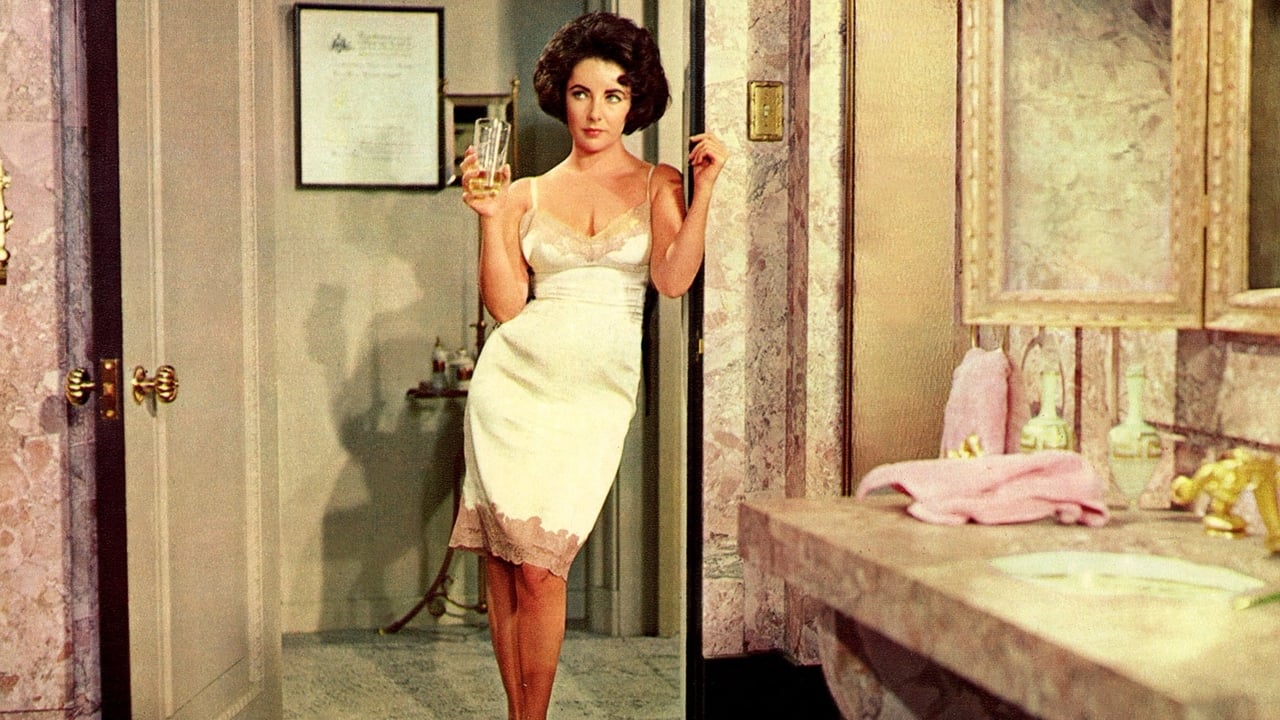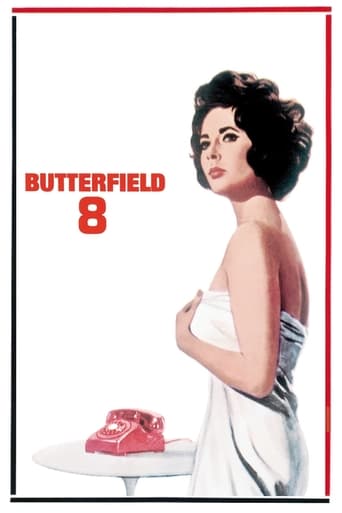

What a waste of my time!!!
... View MoreAm I Missing Something?
... View MoreIt's hard to see any effort in the film. There's no comedy to speak of, no real drama and, worst of all.
... View MoreIf you like to be scared, if you like to laugh, and if you like to learn a thing or two at the movies, this absolutely cannot be missed.
... View MoreThe romantic life of a fashionable Manhattan beauty (Elizabeth Taylor) who is part model, part call-girl, and all man-trap.According to MGM records, the film made $6.8 million in the US and Canada and $3.2 million in other countries, resulting in a profit to the studio of $1,857,000 - making it MGM's biggest hit of the year. This is hardly surprising, given the subject matter. It is very much in the vein of "Breakfast at Tiffany's", though far more open about its main character. (One could watch "Breakfast" and never realize what Hepburn was if they weren't paying attention.) Elizabeth Taylor won a best actress Oscar, which is probably well-deserved. Maybe not her best-known role in retrospect (few today have probably heard of this film), but certainly a nice showcase of her talents.
... View MoreBeing one of the least-regarded among all major Oscar-winning titles, it has taken this me long to check the film out; indeed, I have missed out on countless screenings of it on both TCM UK, Italian and local TV and, for what it is worth, before acquiring the widescreen edition I finally watched, I had already landed a pan-and-scan copy (at the time of star Elizabeth Taylor's passing)! In retrospect, while such glossy melodramas seem so unenticing on paper, actually experiencing them can prove highly entertaining (if not always for the expected reasons) – and this was certainly the case here!The Academy Award bestowed upon Taylor was famously a note of appreciation from her colleagues for having pulled out of a life- threatening illness shortly before; that said, her having stolen co-star Eddie Fisher from his wife Debbie Reynolds was considered water under the bridge by this time – of course, a couple of years down the line, Richard Burton would come into her life and the rest, as they say, is history; in fact, this was her very last film role before attaining superstardom with the long-running Burton association! Anyway, the leading lady had had an impressive run of parts during the latter half of the 1950s (this, in fact, was her fourth nomination in a row – with a second, and more deserving, Oscar coming her way for the best of her many teamings with Burton i.e. WHO'S AFRAID OF VIRGINIA WOOLF? {1966}): here, she plays a high class call-girl (the film's title being her professional number) who principally juggles relations with businessman Laurence Harvey and musician Fisher (a singer in real life, this was the last of only two movie roles of any consequence) among many others. However, the former is unhappily married (into an eminent family) and the latter intends marrying his girlfriend (treating Taylor only for the childhood friend she is but, needless to say, her constant presence in his life and home is not easily explained to the 'other woman'!). For the record, among that year's Best Actress nominees were also Melina Mercouri's star-making turn as a Greek 'whore with a heart of gold'-type in her husband Jules Dassin's NEVER ON Sunday and Taylor was the third actress director Mann guided towards Oscar glory (both flanked by 1960's own Best Actor Oscar winner Burt Lancaster, no less!) following Shirley Booth in COME BACK, LITTLE SHEBA (1952) and Anna Magnani in THE ROSE TATTOO (1955). As I said, this looks good (receiving its sole other Oscar nod for Best Color Cinematography) – given the expected MGM polish – and, while the subject matter (adapted from a John O'Hara novel inspired by true events) is understandably toned-down in view of the Production Code being still in force, the script proves so hilariously overwritten (especially the quips Betty Field – best friend to the star's mother, played by Mildred Dunnock – makes with respect to Taylor who, incidentally, describes herself to the latter as "the slut of all time") that one cannot help but have a field (no pun intended) day with it! Typically, watching expensive production values and a familiar cast at work can be enough for a film – especially when, as here, there is little substance otherwise; perhaps more surprisingly, there were several instances of sloppy editing and continuity errors throughout which, frankly, only added to the fun! Unlike the actress herself, there is no happy ending for the film's heroine; curiously enough, the same year also saw the release of another O'Hara soaper i.e. FROM THE TERRACE (itself yet another teaming of another famous Hollywood couple: Paul Newman and Joanne Woodward) while Taylor and Harvey would themselves be reunited much later for his penultimate effort, the psychological thriller NIGHT WATCH (1973).
... View MoreThe movie is about a high-priced call girl. Elizabeth Taylor as Gloria Wandrous is a prostitute but Hollywood, in 1960, still bound by antiquated production codes couldn't reveal her real resume. This leaves the film uncomfortably constrained and contrived. The audience has to go with what's presented, a story line crafted to sanitize the world's oldest profession. So the censors have given us a character Gloria, who is a "club girl," a model paid to wear fashionable clothes and be seen in trendy watering holes. These gathering places are frequented by men in suits, the wealthy and influential whose hands are never empty of a glass, downing one drink than another, the highball or martini. Gloria, a "good time girl," is promiscuous, BUT what she's really selling and out to get is "true love." She herself is an elitist in her own line of work, not just a common gold digger, but also a girl with an elevated purpose. And then in comes one of the regulars Gloria has hooked, Weston Liggett played by Laurence Harvey. Harvey's an actor accomplished at playing characters practicing deception and enduring subsequent remorse, and he's able here to deliver this type of troubled personality. Liggett, we soon learn is suffering from a terrible malady. He is married to a wealthy society woman, and works for the family company where he feels undervalued and unproductive. With all the entitlements of the good life, he is still a wretch, enslaved to a life of dull, staid opulence. His wife Emily, played by Dina Merrill, is the ever suffering, understanding spouse, putting up with her husband's philandering. His wife's indulgence of his shortcomings only increases Liggett's self-loathing and guilt. What's a young, good-looking man with money to do when he's destined to endure such a banal lifestyle? Why take up with a fancy slut and then of course, fall obsessively, madly in love with her. Eddie Fisher, Taylor's husband at the time, is awkwardly positioned into this melodrama, giving less a performance than a "walk through." He plays Gloria's childhood friend Steve who serves as her devoted, unfailing confidante. He's always there for her when she is in need of emotional support, which for Gloria means an almost daily cry for help. Steve's jealous finance Norma hates his relationship with Gloria. Susan Oliver as Norma gives a serviceable performance as she has little to do but by turns look aggrieved and frustrated. Her confrontations with her boyfriend Steve are verbal jabs, inviting Steve to challenge her dramatic statements, ones usually centered around Gloria's cheap behavior: "Is she not the biggest tramp in the whole city!" Since Manhattan contains somewhere around 8 million inhabitants this is certainly quite a distinction. Mildred Dunnock is Gloria's mother, a woman living a genteel life of denial. Her daughter is a "good girl." Mrs. Wandrous' one time man friend, and prospective husband, sexually abused the young teen-aged Gloria, a heinous exploitation over a protracted period of time. Whether the mother even knows of her daughter's childhood ordeal is never in fact made clear to the audience. Kay Medford, provides the most noteworthy, spirited performance in this otherwise dour production. She is the ironically named Happy, the owner of a popular motel, a rendezvous for illicit love. Happy, herself a "good time girl" in her younger days, maintains a cynical but upbeat philosophical outlook on life. She's a self-defined expert on male/female relationships, the guru ready to dole out wisdom and advice gained from her own hard luck lessons of life. Elizabeth Taylor reportedly disliked making this movie and her displeasure shows. Her portrayal is deficient in conveying the emotional and physical scars of misuse. Taylor gives us the emotional posturing of an uninspired acting technique. She's too much The Screen Goddess throughout, unblemished by any of the authentic grit and misery defining a victim of a sordid past and present. No piece of used merchandise, Taylor on screen is every inch the Movie Star. Liz got the best actress Oscar for this movie, purportedly the "pity vote," in acknowledgment of the illness that almost took her life. The win certainly couldn't have been for the undistinguished performance she gave in this movie.
... View MoreI love BUTTERFIELD 8 but agree it's more good than great -- or, as the phrase goes, "great trash".I don't mind Eddie Fisher, but Harvey is too sleazy (and not in a good way) for my tastes in the role. I always recast him in my head with James Mason. I also believe Taylor very much deserved her Oscar for this, even if she didn't think so (and her bitterness stems from the fact MGM forced her to do the movie after telling Mike Todd she wouldn't have to make anymore pictures she didn't like before her contract expired in 1960). She's fabulous in this. Her "I loved it!" confessional scene is kind of jaw-dropping... And I can watch her to-period "tragic" car accident till I'm blue in the face from howling like a hyena. It's laugh-out-loud funny.Part of why the picture almost works is of course the era, that fresh, haunted, end-of-the-world, early-early-'60s thing going for it, albeit in Ektachrome or whatever the hell they were using... Funny how the pastels of the late-'50s/early-'60s were so much more vibrant: I loved the soft blue phone and the soft pink phone set against the pink bathroom tile -- those sooooo bring back childhood memories... It's hard to describe the look that these had from that period; they were almost child's playhouse floating-on-a-cloud colors. And the cars which were easter egg colors and even primary colors. Every car color has been so muted for decades now -- you never see a primary color for a car anymore.Semi-great sudser, lifted to a level of art by a defiant Taylor.
... View More